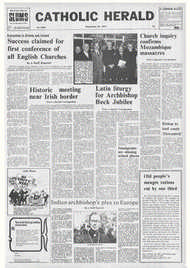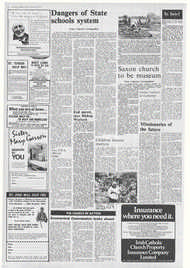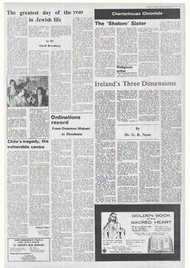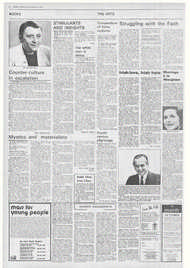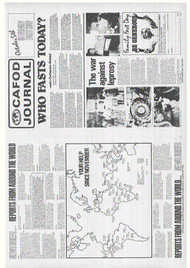Page 1, 28th September 1973
Page 1
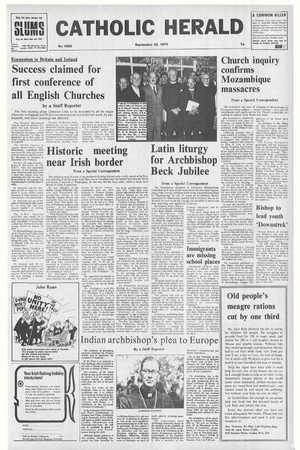
Report an error
Noticed an error on this page?If you've noticed an error in this article please click here to report it.
Tags
Share
Related articles
Tete Oppression 'worse Since Massacre Report'
Rhodesians Involved In Killings In Mozambique, Says Un...
Priests 'give Details Of Massacres'
Vatican Considering Further Moves On Mozambique
Portuguese Commander Denies Massacres
Church inquiry confirms Mozambique massacres
From a Special Correspondent
The massacres last year of villagers in Mozambique by Portuguese Army soldiers — mostly African — were quickly investigated and confirmed by the Church authorities, according to reports from Rome last week.
The investigation established that massacres took place at Wiriyamu, as stated in the account by Fr. Adrian Hastings, published in The Times in July, and at Chawola.
Following rumours that a large number of civilians — 300 or more — had been killed, an investigation was ordered by Bishop Augusto Cesar Ferreira da Silva of Tete, in whose diocese Wiriyamu was situated.
It was said, according to the Rome report, that the massacre took place after the troops had been fired on by guerrillas of the Mozambique Liberation Front (Frelimo).
The investigation was carried out by two priests, one an African, who knew the area well. They first reported that 53 villagers were killed at Chawola on or about December 16. Their second report on the massacre at Wiriyamu was the source of the account by Fr. Hastings.
It also said that the findings had not been denied by Portuguese officials who had visited the area three weeks after the massacre had taken place. The report was presented to the Episcopal Conference of Mozambique in January.
At least one member of the conference informed diplomatic representatives of Catholic countries in Lourenco Marques. Later, representations were made in Lisbon.
The Pope received the Bishop of Tete early this month, when presumably the report was discussed.
The Lisbon Patriarch's office, however, has said that the only statement released in Lisbon by churchmen on the Mozambique massacre allegations had come from the Mozambique Bishops Conference.
The Patriarch's official spokesman said Cardinal Patriarch Antonio Ribeiro .himself had issued no statement on the allegations as reported by The Times last week.
The statement published in The Times included excerpts from a letter from the Mozambique conference to the province's Governor-General written more than three months before reports of the alleged massacre by Portuguese troops of Mozambique villagers first appeared in the British press last July.
As published in The Times the long statement expressed the Mozambique Bishops' "repugnance, which we have always shown, against all acts of violence which are opposed to the rights and lives of human beings . . . ".
The Lisbon Patriarch's spokesman said the statement from the Mozambique bishops had been issued to Portuguese newspapers through Mgr, Cezinando Rosa, a permanent secretary of the Metropolitan Bishops Conference, which covers continental Portugal.
Mgr. Rosa later confirmed that the president of the Mozambique conference, Bishop Francisco Texeira, of Quelimane, gave him a few copies of the statement, to be issued to Portuguese newspapers, but censorship prevented its publication.
Mgr. Rosa said he had run out of copies of the statement and local press sources could not produce one. He reiterated that the Lisbon Patriarch had absolutely nothing to do with the statement.
blog comments powered by Disqus


